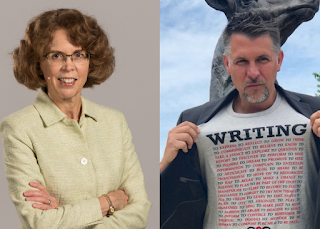The two of us teach children's and young adult literature in many avenues, including courses, and it was wonderful to be alongside one of my favorite Fairfield University mentors for the conversation.
The exhibit is running until early February and is one that sparked my own imagination as I recalled stories that mattered to me as kid, as well as stories that matter to me out, especially in the #WeNeedDiverse Books movement. I was thrilled to see that Dr. Bowen was on her A-game and also brought attention to the need of representation, inclusion, and rethinking of how narratives guide imagination, morals, and identity.
I am in agreement with Dr. Ebony Elizabeth Thomas, who writes in her scholarly text, The Dark Fantastic, “storytelling requires decolonizing our fantasies and our dreams. It means liberating magic, itself.” p. 169
I had a bit of an adrenaline rush while presenting and for a short while my mind wasn't on the devastating ways Covid affects the body. For that, I am thankful (I hope I didn't cough too much. I was equipped with water and throat candy).
But I do question how Alice in Wonderland becomes part of the global fantastic in ways that say, Octavia Butler’s Parable of the Sower has not…I think we are in a location now where thinking critical about representation in our story consumption matters. All cultures have stories. All readers find themselves in these stories. Here I am thinking of scholar Stephanie Toliver who writes critically about representation in her work. She discusses that she wants to see books so that young Black females are part of the narratives and writes, She dreams of a world where Black girls aren’t forced to minimize their genius and where school spaces protect them….where they will be encouraged to use their creativity to set crooked systems straight.
I'm happy to see, too, that they shared the conversation on their Facebook page for individuals who could not attend. Now, I am concentrating on more rest and recovery, and hoping I will feel good enough to visit Pequot Library to see the full display. I know, however, the digital work put forward by their librarians and staff deserves a round of applause!
Honestly, the real world today is more fantastical and imaginary than I ever thought it would be when I was a kid. The innocence is stripped at a much younger age, but I would think that fantasy is a panacea. Harry Potter/Voldemort and Death Eaters, Frodo/Sauron and Orcs, Marvel movies - there’s always a bad side, and a side for good. It always amazes me coming away from the stories that anyone would say, “I side with the Orcs,” or “If only Lord Voldemort would slaughter all those bratty kids at Hogwarts.” Yet, in the real world they do. That is why we need to be cautious of those banning stories in our schools today.

